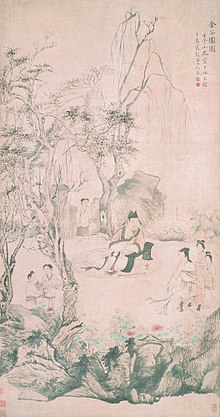Lüzhu

Lüzhu (simplified Chinese: 绿珠; traditional Chinese: 綠珠; pinyin: Lǜ zhū), (her name meant 'green pearl') also called Liang (died 300) was an Ancient Chinese Gējì,dancer and music teacher.[1][2]
She was bought by Shi Chong (249–300), an official of Emperor Wu of Jin, and was his concubine.[2] She became famous for her artistry and beauty, as she entertained his guests as a Gējì and dancer.[3][4] She also composed music, and made poetry into songs by composing music for it. The famous composition Aonao qu has been attributed to both her as well as to Shi Chong.
When a high official from the Imperial court -Shi Chong's rival, Sung Xiu - demanded to buy her, Shi Chong refused to sell.[2][5] Shi Chong was then arrested and ordered to commit suicide, upon which Lüzhu herself committed suicide.[4][2] Lüzhu is depicted in the Wu Shuang Pu (無雙譜, Table of Peerless Heroes) by Jin Guliang.[4]
References
- ^ Lily Xiao Hong Lee, Clara Lau, A.D. Stefanowska: Biographical Dictionary of Chinese Women: Antiquity Through Sui, 1600 B.C.E
- ^ ISBN 978-0-7546-6672-1.
- ^ 《晋书石崇传》:崇有妓曰绿珠,美而艳,善吹笛。孙秀使人求之。崇时在金谷别馆,方登凉台,临清流,妇人侍侧。使者以告。崇尽出其婢妾数十人以示之,皆蕴兰麝,被罗縠,曰:“在所择。”使者曰:“君侯服御丽则丽矣,然本受命指索绿珠,不识孰是?”崇勃然曰:“绿珠吾所爱,不可得也。”使者曰:“君侯博古通今,察远照迩,愿加三思。”崇曰:“不然。”使者出而又反,崇竟不许。秀怒,乃劝伦诛崇、建。
- ^ ISBN 978-90-474-3097-1.
- ^ Palumbo-Liu, David Jason (1988). Signing the Palimpsest: Huang Tingjian (1045-1105) and the Poetics of Appropriation. University of California, Berkeley.
External links
(Chinese language) Lüzhu on the site of Baidu Baike
